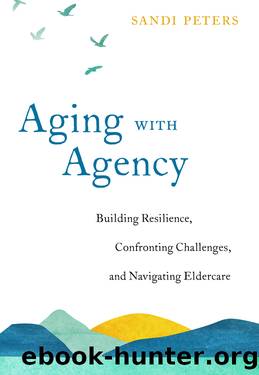Aging with Agency by Sandi Peters

Author:Sandi Peters [Peters, Sandi]
Language: eng
Format: epub
ISBN: 9781623174378
Publisher: North Atlantic Books
Published: 2020-04-06T00:00:00+00:00
Shifts in the Relational Dimension
The third and final dimension Tornstam observed in his research has to do with the relational and social aspects of life. First and foremost among these is a lessening of emphasis on social roles. Throughout the first half of life, most of us are identified with our masks (personas) or roles. With retirement, we no longer have to function in those capacities. Freed from our confines, we begin to see how tightly we were held by the demands of our roles.
As we discover our authentic self, there is a lessening of interest in superficial relationships. Perhaps because we know time is no longer endless and our energy is not what it was, we tend to become more parsimonious with our time. If you are sixty-five or older, consider whether you have experienced a winnowing of friends. Some of us, particularly women, have a history of being there for others who drain us of energy or who are not able or willing to share equally in the friendship. As we begin to know ourselves more intimately, we often begin to value time with ourselves and a few reciprocating others. We are less willing to squander time, especially since doing the reflective work essential to this part of life requires solitude.
For those still in midlife or younger, an elder’s day can look like nothing was accomplished. As an experiment, stop reading for a minute, close your eyes, and see what thoughts arise.
What predominates in your mind when you do this? Engaged as we are in the rough-and-tumble of life, we’re often preoccupied with thoughts of work, plans we’re making, or conversations we’ve had or expect to have. Older people don’t have most of these pressures. They can allow the mind to find its own ground. They can spend time in reverie. To younger people, the quietude of some elders may look like lethargy or passivity. However, like the duck who seems to sail so effortlessly across the lake yet is constantly flapping its feet below the surface, that elder is allowing the interior landscape to unfold at a natural pace. Solitude becomes an essential and fundamental necessity to meet the unknown—and sometimes the unknowable—at this time. If we do not know how to use our alone time, loneliness ensues; if we do know how, solitude opens the door to a barely charted world within.
Solitude leads naturally to what Tornstam suggests is modern asceticism. Elders begin to see the underside of the consumer culture, and they understand that owning things can be burdensome. They naturally sympathize with the counterculture that says less is better. This can manifest in simplicity of choices, fewer relationships, limited goals, and culling of possessions. This process, while natural, does not occur for all elders. It requires a commitment to live the reflective life.
Jane Thibault, clinical gerontologist emerita at the University of Louisville’s School of Medicine, offered a very compelling perspective at an American Society on Aging conference in the early 1990s. Ever since then I have kept the handout from her workshop.
Download
This site does not store any files on its server. We only index and link to content provided by other sites. Please contact the content providers to delete copyright contents if any and email us, we'll remove relevant links or contents immediately.
Effortless by Greg McKeown(1473)
Word Power Made Easy by Norman Lewis(1311)
How to Not Die Alone by Logan Ury(1304)
Beyond Order by Jordan B. Peterson;(1296)
So Good They Can't Ignore You by Cal Newport(1256)
The Power of 100! by Shaun King(1066)
Chatter by Ethan Kross(1061)
100 Things Successful People Do by Nigel Cumberland(1026)
Master of One by Jordan Raynor(1002)
Lives of the Stoics by Ryan Holiday & Stephen Hanselman(965)
Napolean Hill Collection by Napoleon Hill(942)
The High 5 Habit by Mel Robbins(935)
The Art and Science of Results by Joe Vitale(908)
Be Your Best Self by Mike Bayer(886)
Kinesic Magic by Donald Tyson(842)
Friday Forward by Robert Glazer(836)
Career Fear (and how to beat it) by Somi Arian(833)
The 7 Habits on the Go by Stephen R. Covey(821)
The Practice Is the Path by Tias Little(816)
